Portrait Mode is a new photo essay series of Singapore and all the people and things in it, seen through the lenses of our young photographers at Mothership.
This week, we meet Sin Ee Lye Heng, a family-run Teochew puppet troupe to understand their craft as well as their struggles in continuing a dying trade.
I first met Christine Ang at her rental flat in Jalan Tenteram.
The 22-year-old, together with her family, runs Sin Ee Lye Heng (新怡梨兴潮剧团), a Teochew puppet troupe — said to be the last existing one in Singapore.
 Christine Ang. Image by Joshua Lee.
Christine Ang. Image by Joshua Lee.
The Jalan Tenteram flat is too small for the family of five.
Boxes containing puppet parts, stage props and even a wooden stage swallow up the entire area outside the Angs' flat on the first floor, threatening to invade their neighbours' corridors.
Beautiful puppets
Sin Ee Lye Heng has about 50 puppets in their arsenal that they use for their shows.
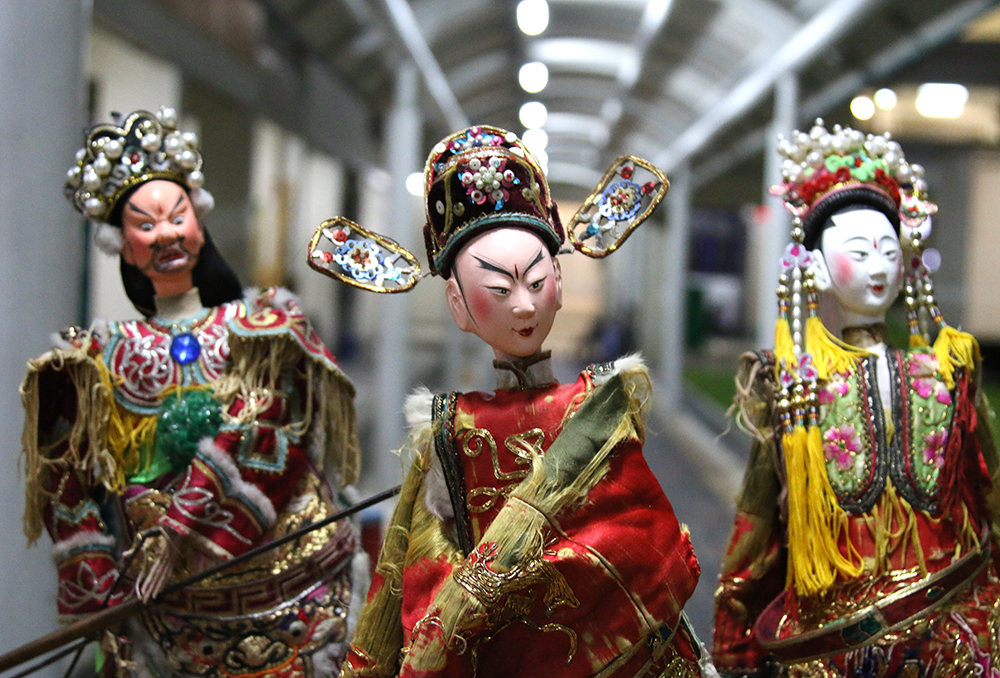 Puppets used by the Sin Ee Lye Heng puppet troupe. Image by Joshua Lee.
Puppets used by the Sin Ee Lye Heng puppet troupe. Image by Joshua Lee.
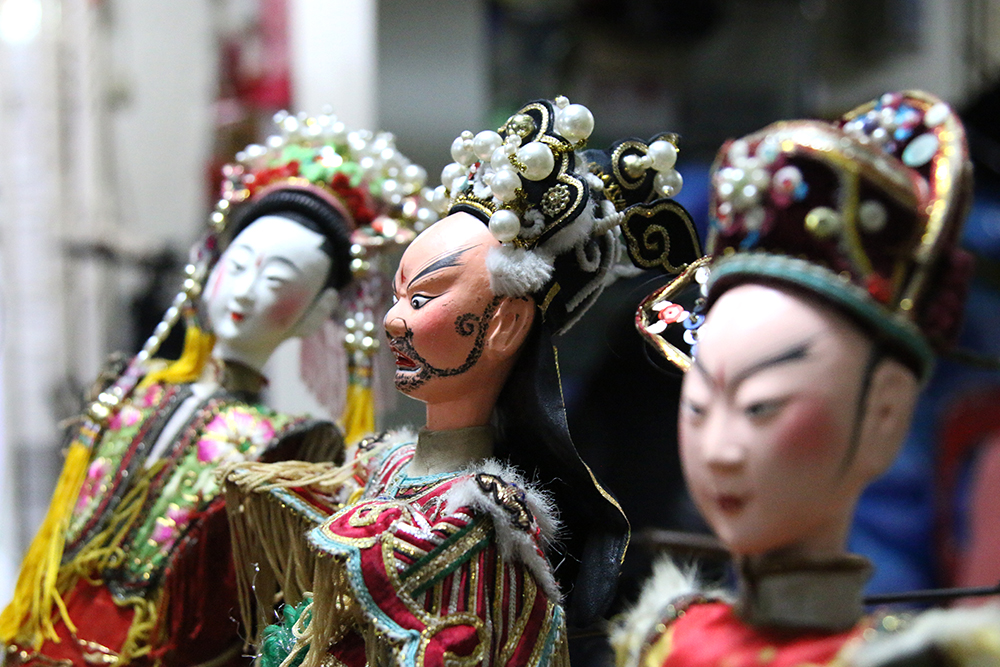
The troupe was started by Ang’s grandmother in 1977 after she learnt the ropes from another puppet troupe in Singapore.
Ang takes out a few puppets to show us — a lady, a nobleman, and a villain.
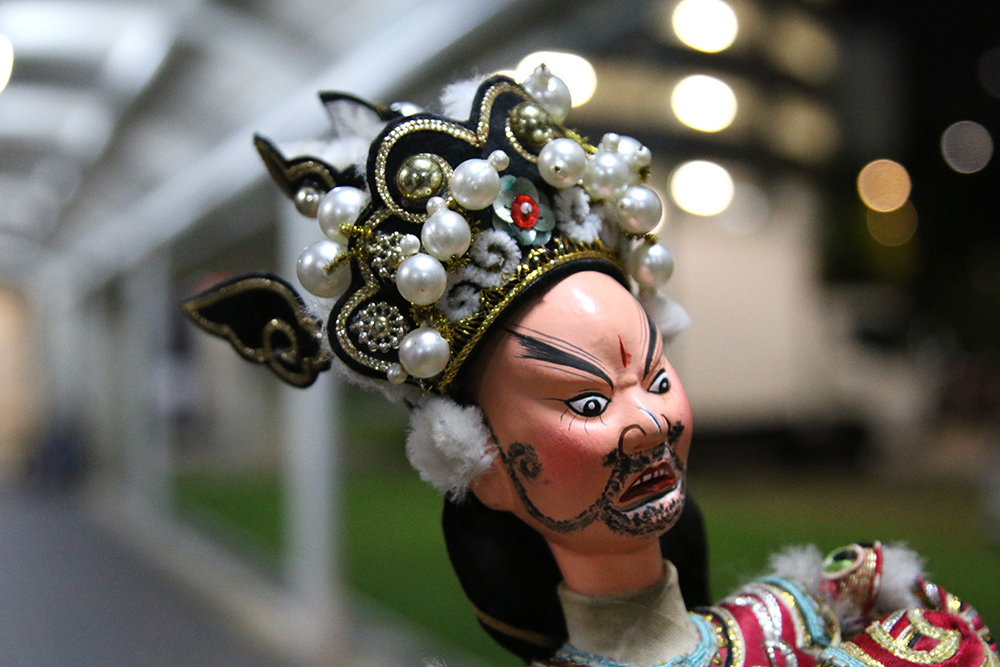 A puppet painted with a villain's face. Image by Joshua Lee.
A puppet painted with a villain's face. Image by Joshua Lee.
The puppets, while a little shabby and frayed, still make a fascinating study.
Standing at 12 inches tall, each puppet is dressed in vibrant and intricate costumes. Their heads, which are made of clay, have delicate features carved and painted onto them.
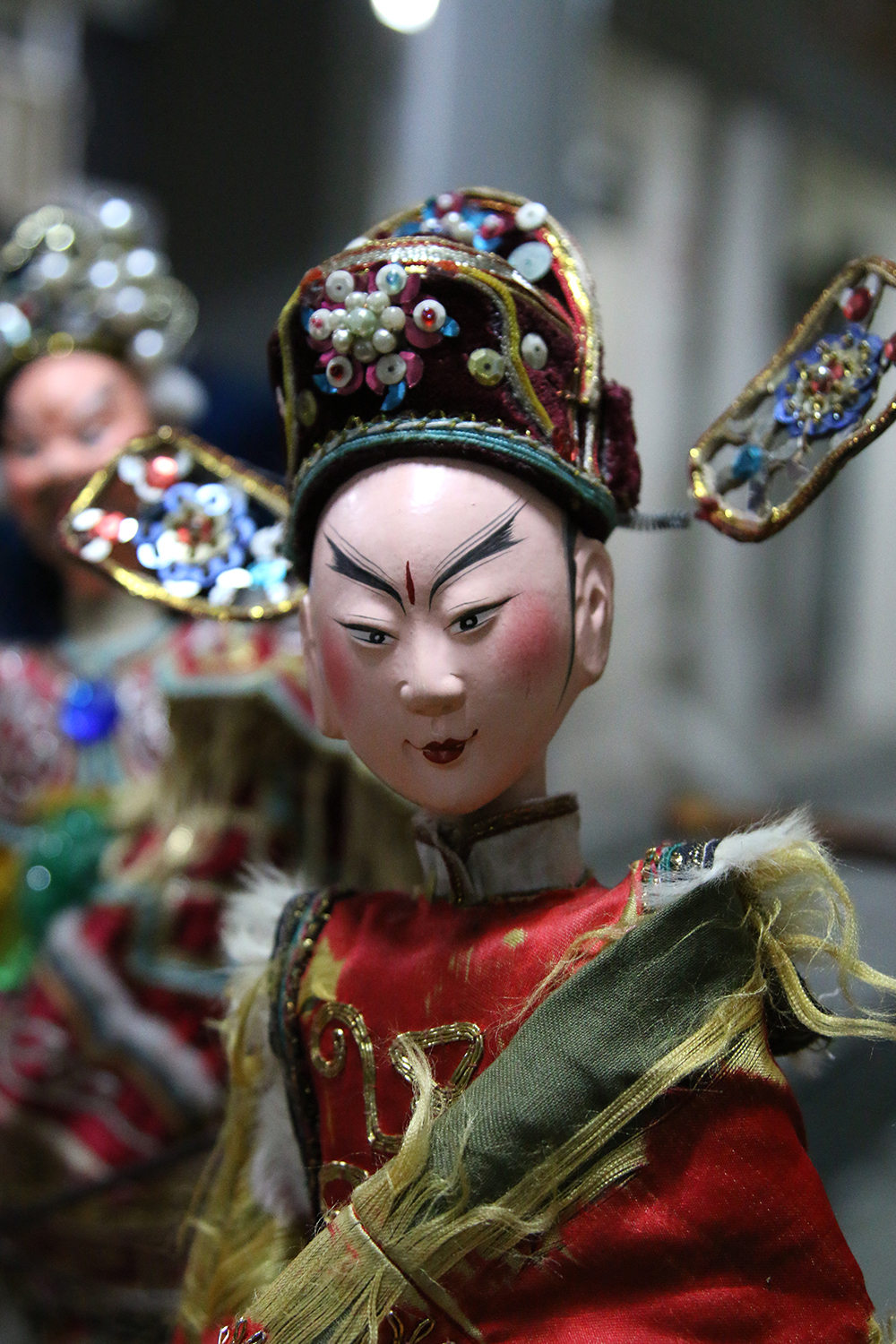 Image by Joshua Lee.
Image by Joshua Lee.
“These puppets have been with us a long time, so their clothes are a bit old,” says Ang, as she holds a puppet with worn out sleeves.
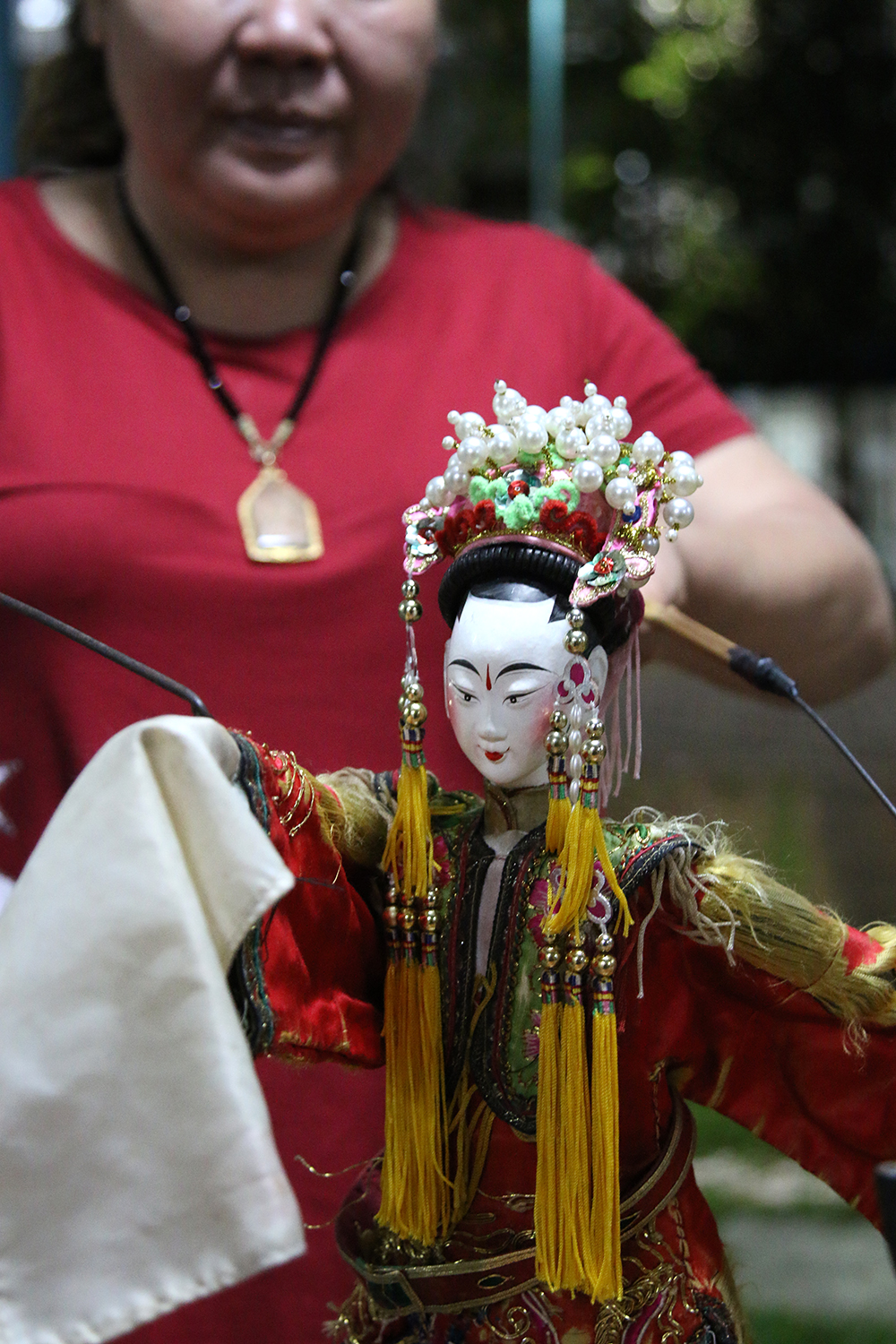 The puppets' costumes have seen better days. Image by Joshua Lee.
The puppets' costumes have seen better days. Image by Joshua Lee.
It’s hard to repair these puppets as puppet artisans in Singapore and Malaysia are hard to find today.
One could buy new puppets like this today from China but they don’t come cheap. One individual's set comprising a head, body and headgear, costs about 800 yuan (S$159) each, according to Ang.
“A single head costs about S$45 on Taobao,” she quips.
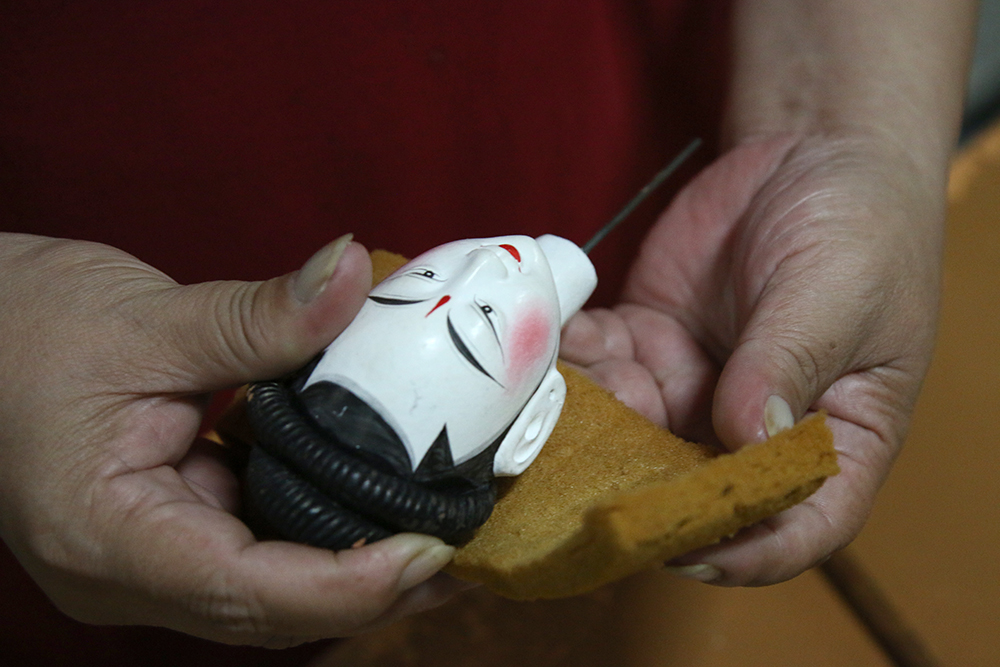 Puppet heads must be wrapped carefully to prevent chips. Image by Joshua Lee.
Puppet heads must be wrapped carefully to prevent chips. Image by Joshua Lee.
Even so, the difference in quality between older puppets and newer ones is quite obvious.
Ang shows me a female head with a luscious lock of real human hair — made by her grandmother decades ago.
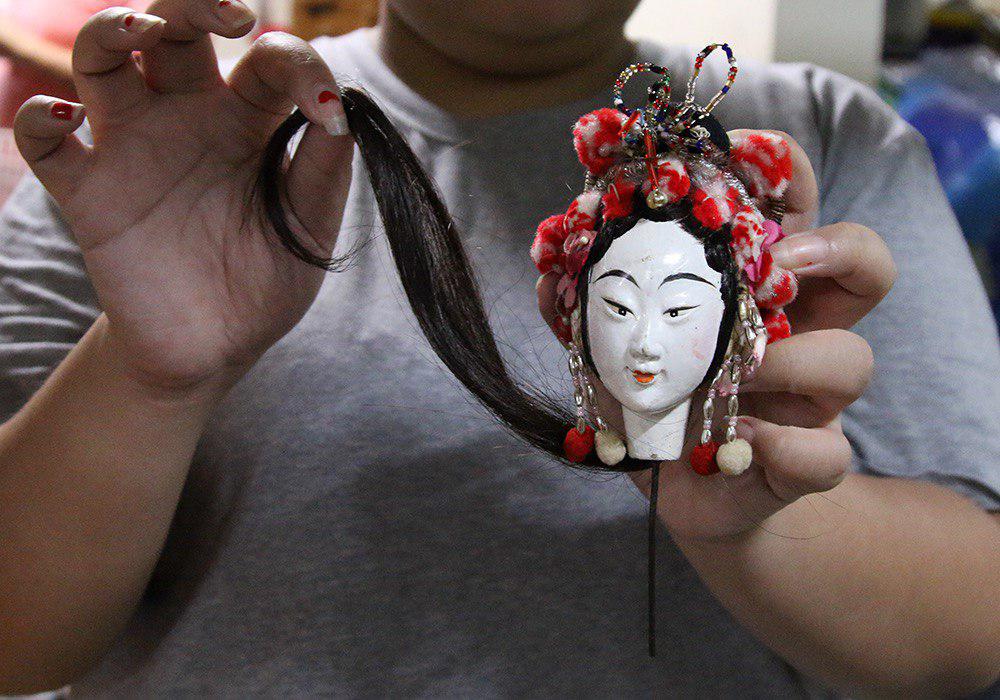 Photo by Joshua Lee
Photo by Joshua Lee
It feels like, well, hair. Next to it, the hair from China-made puppet head feels like gauze.
 Puppet heads. Image by Joshua Lee.
Puppet heads. Image by Joshua Lee.
A family-run troupe
Today, Sin Ee Lye Heng is run by Ang’s mother, Tina Quek, 50, after Ang's grandmother passed away in 2007.
Ang and her brothers Wei Hao and Wei Li have since very young helped Quek with running the troupe — first by learning to sing and play instruments, such as the yang qin (a dulcimer) and the suo na (a wind instrument) before progressing to puppet work.
 (L-R) Christine Ang, Ang Wei Hao, Tina Quek, Ang Wei Li. Image by Joshua Lee.
(L-R) Christine Ang, Ang Wei Hao, Tina Quek, Ang Wei Li. Image by Joshua Lee.
Even the Teochew that is sung is a refined version of everyday Teochew — what Quek calls wen yu, which requires years of practice to learn and understand.
“I started by learning Teochew opera at the age of 10,” says Ang who went on to apprentice as a puppeteer when she was 13.
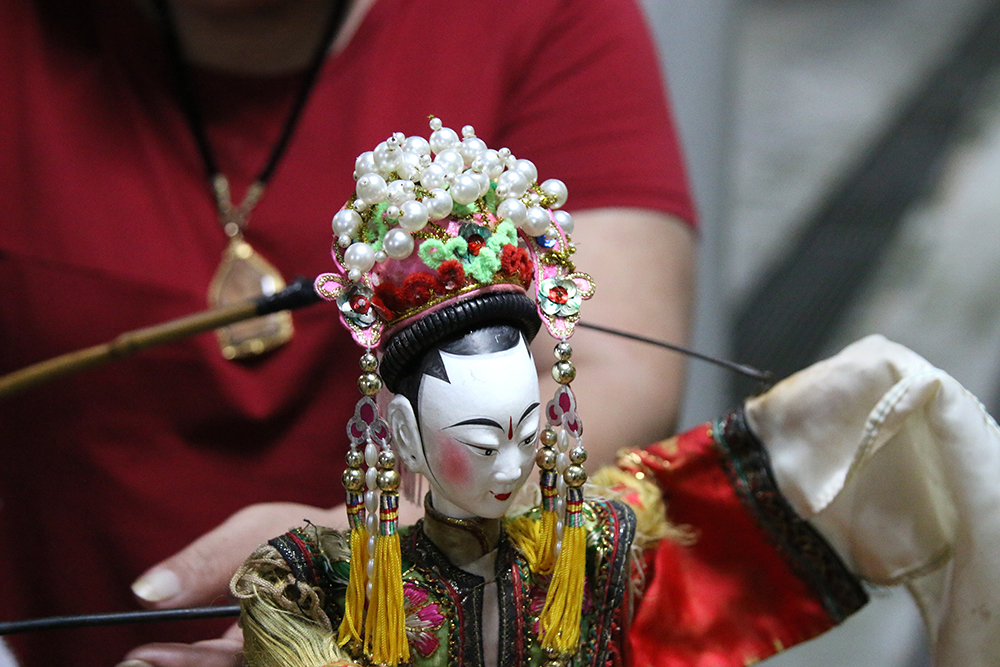 Just like Teochew opera, Teochew puppet shows are sung using a refined version of the dialect. Image by Joshua Lee.
Just like Teochew opera, Teochew puppet shows are sung using a refined version of the dialect. Image by Joshua Lee.
Over the nine years of performing puppet shows, Ang is very confident as she demonstrates how to handle the puppets.
The puppeteer manoeuvres three metal sticks to control the puppet. One stick is connected to the puppet’s body while the other two controls both arms.
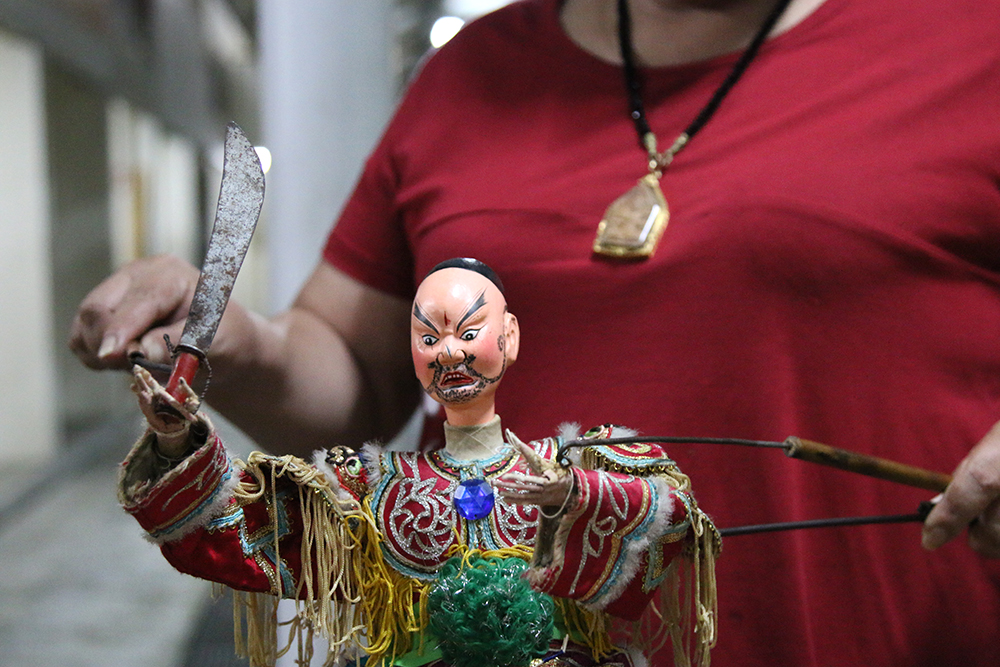 Quek demonstrates how to hold a puppet. Image by Joshua Lee.
Quek demonstrates how to hold a puppet. Image by Joshua Lee.
“We use our last three fingers on our right hand to grip the middle stick (which holds the puppet body). Our right thumb and index finger control the puppet’s right hand. The left hand controls the puppet’s left arm,” Ang explains.
To a newbie like myself, the puppets are unwieldy and difficult to coordinate but Ang and Quek handle it skillfully; their fingers move with amazing dexterity, trained from years of practice.
Juggling part-time jobs
The Ang family works part-time jobs whenever they’re not performing.
Ang and her brothers started working as hotel banquet waiters when they each turned 16 to supplement the family income.
When the Ang children were younger, juggling performances and school took a toll on their results. Many times, the children could not turn up for school because they were too exhausted.
“I had to see their principals often and explain that the children were helping to bring in family income,” says Quek.
Eventually, Ang decided to stop studying after secondary school, partly because of the workload and partly because she was not interested.
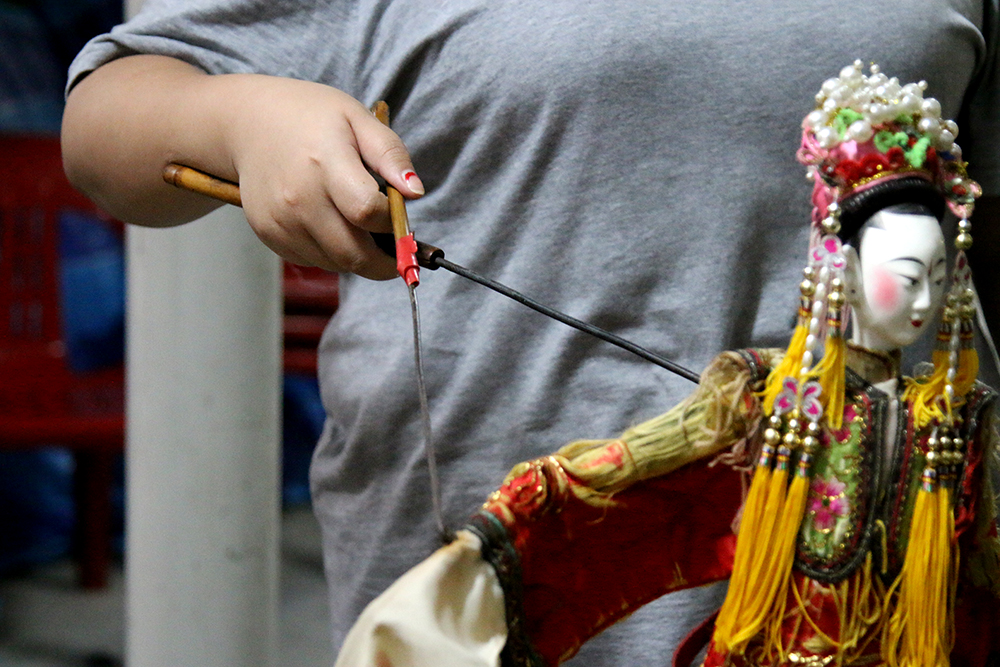 Ang decide to stop schooling to focus on the puppet troupe. Image by Joshua Lee.
Ang decide to stop schooling to focus on the puppet troupe. Image by Joshua Lee.
“I always feel like sleeping whenever I study,” says Ang. “People keep asking me to go back to school but I guess I don’t have any interest in studying.”
Not having to study means she can devote all of her time to the puppet troupe.
“Very few people do this today, so we have to do it, I guess,” Ang says softly.
“In the past, crowds would gather to watch our shows. We still have people who come to watch today — mainly older folks, not so much the younger ones, ” she adds.
It’s a dilemma for Quek who feels passionately about the need to continue work that her mother started, but knows at the same time that it is increasingly unsustainable.
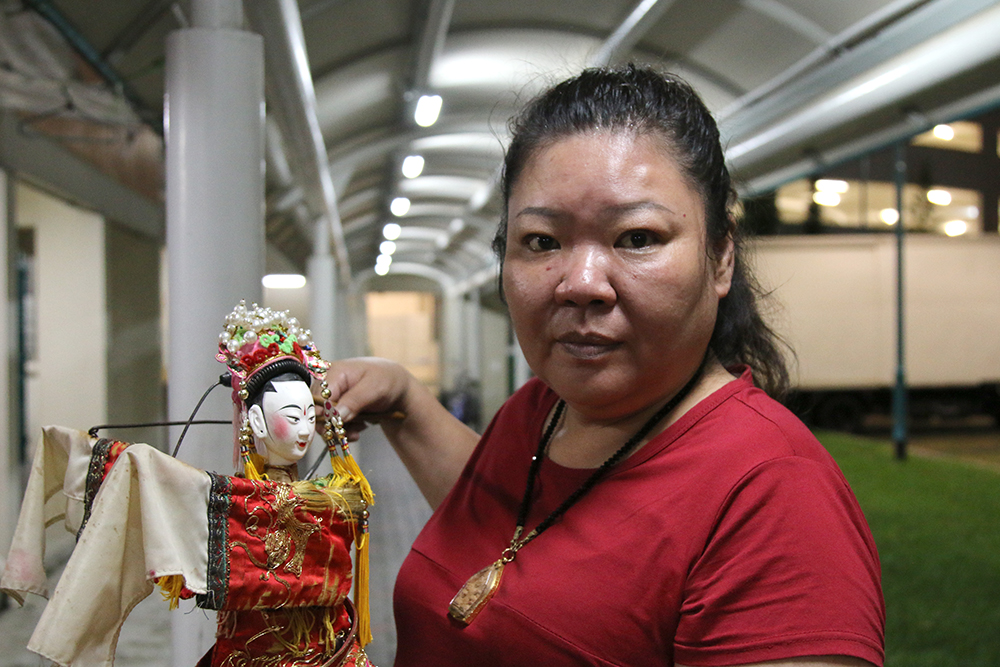 Quek took on the mantle from her mother to carry on her legacy. Image by Joshua Lee.
Quek took on the mantle from her mother to carry on her legacy. Image by Joshua Lee.
“We have our daily needs, we need to feed ourselves. Some months, we are only booked for two days of performances. The rest of the days we need to find other work so we can’t dedicate our all of our energy and time to improving our craft.”
“In the past, I just need to watch a show three times and I can commit it to memory. Today, even after watching it 30 times, I just can’t,” laughs Quek.
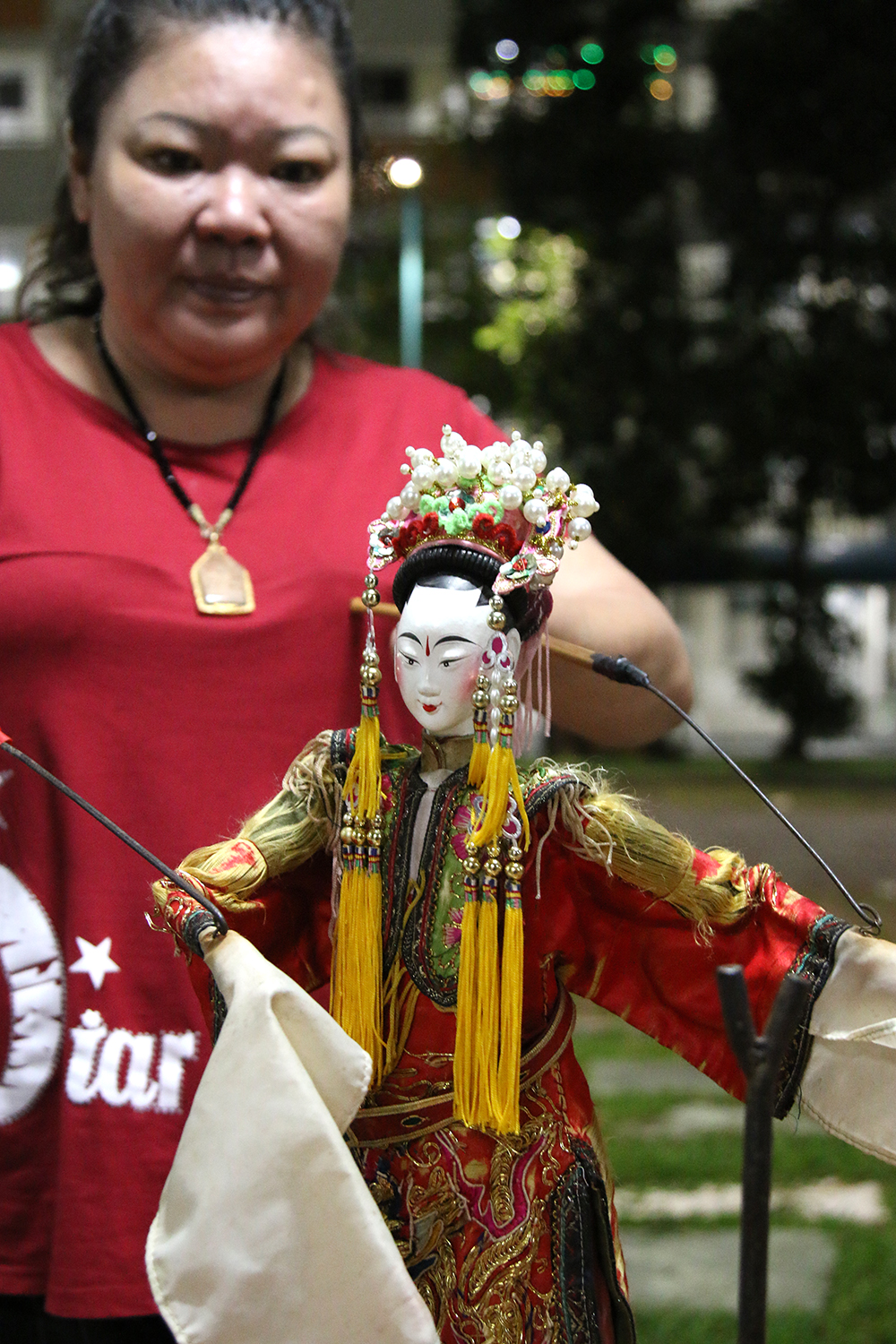 It's harder today to focus on the puppet troupe when there are other daily needs competing for her attention, says Quek. Image by Joshua Lee.
It's harder today to focus on the puppet troupe when there are other daily needs competing for her attention, says Quek. Image by Joshua Lee.
A mother's dilemma
Quek is not shy to admit that the puppet troupe is not raking in a lot of money.
“I worry about my children continuing this job because I’m not sure if they will earn enough to feed themselves. Will they have enough to eat?”
“I used to do this because I wanted to carry on my mother’s legacy,” she says.
“In fact, I was very afraid to pass on my skills to my children when they were young. But they developed an interest in it and they do have the talent for it.”
Because of this, Quek decided two years ago to venture beyond temple performances and start taking up jobs with museums and cultural events in order to bring in more opportunities and revenue.
 Ang and her brother remain passionate about the puppet troupe. Image by Joshua Lee.
Ang and her brother remain passionate about the puppet troupe. Image by Joshua Lee.
Updating Teochew puppet shows for a younger audience
Listening to Ang and Quek, it’s quite evident that Teochew puppet shows are a dying art. Do people still want to watch them? Is there a future for them in Singapore?
Ang is unsure.
“Actually I’m not sure if it is right to say that no one wants to see Teochew puppet shows. The problem is that people today might not understand the dialect, especially the refined dialect used in operas. They might get bored. Even I can’t understand some of the Teochew operas I watch.”
“We do see about one or two young people who come watch our show, but they will leave after five minutes,” quips Quek. “They don’t understand what we’re singing!”
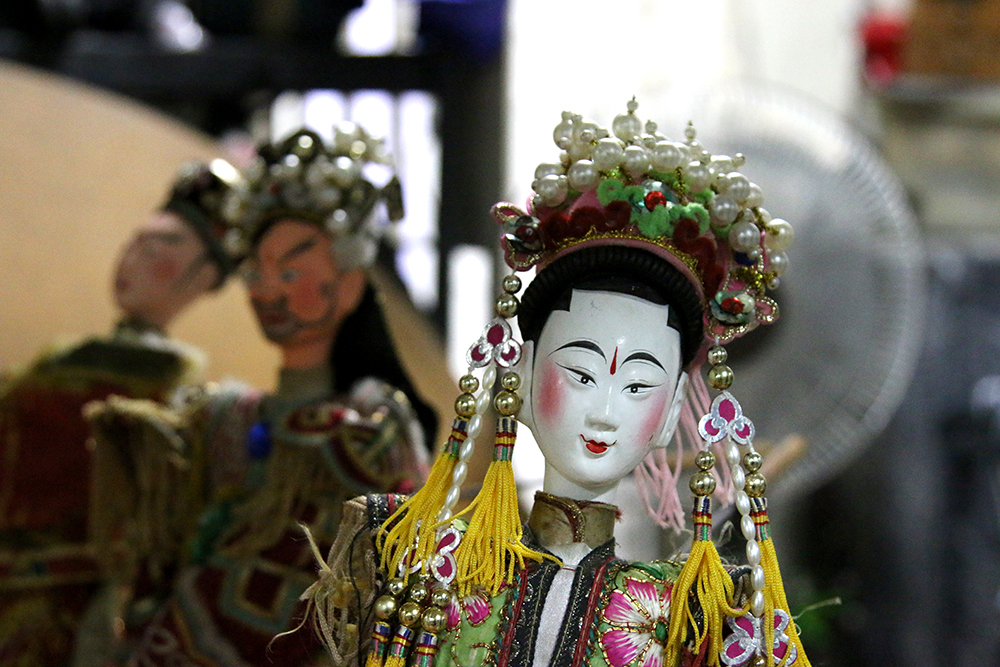 Image by Joshua Lee.
Image by Joshua Lee.
Ang thinks that more young people might come if Teochew puppet shows are updated:
“For example, we can include subtitles. And today it’s common for troupes to use a fog machine to add smoke effects which complement the show.”
However, there is a limit to how much Quek is willing to compromise on tradition to attract new blood. For example, she draws the line at singing in Mandarin or English instead of Teochew.
“We are a Teochew troupe. It’s our culture. If I change it, the flavour is lost. If I ask you, a guy, to wear women’s clothing, would you?"
Quek's words rang in my mind as I departed.
Do we really need to change tradition to make it more accessible? How much of tradition can we change before it isn't tradition anymore? There are no easy answers, but for Sin Ee Lye Heng, time is running out.
Sin Ee Lye Heng will be performing at the Singapore Chinese Cultural Centre's Cultural Extravaganza on June 9, 2019 from 11am too 12.30pm. More details can be found here.
Top image by Joshua Lee.
If you like what you read, follow us on Facebook, Instagram, Twitter and Telegram to get the latest updates.
